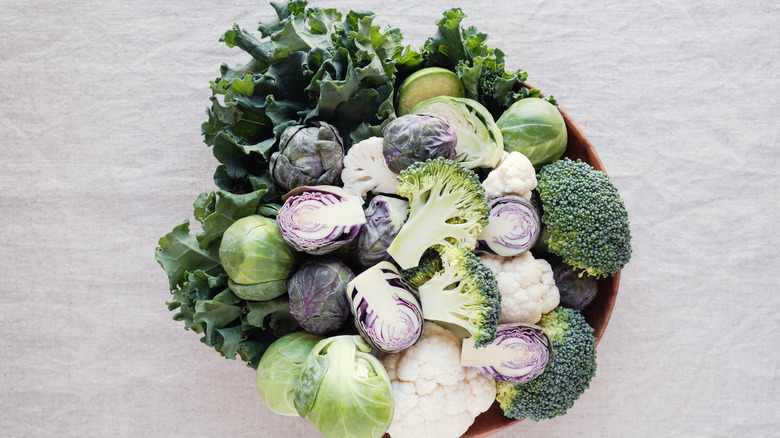Avoid Eating Cauliflower If You Have This Medical Condition
Cruciferous vegetables like cauliflower, broccoli, kale, Brussels sprouts, spinach, and cabbage are rarely, if ever, on a "don't eat" list when you're trying to eat healthy. That's because they're packed full of nutrients that have both anti-inflammatory and antioxidant properties. They contain a good amount of protein, fiber, vitamins, and other minerals. If you're looking to lower your risk of heart disease, prevent cancer, boost your immune system health, and consume enough dietary fiber to aid your weight loss goals, cauliflower and other nutrient-dense vegetables in the same family can be your best friends.
If you have chronic obstructive pulmonary disease (COPD), however, these items should be on the list of foods you should avoid eating. COPD is an inflammatory lung disease that makes it difficult for you to breathe in oxygen and breathe out carbon dioxide like you normally would. Long-term exposure to smoking (passive included) and exhaust fumes from burning fuel are thought to be some of the main causes of COPD. For someone with the medical condition, breathing could become laborious. They might experience shortness of breath during physical activities, wheezing, a tightness in the chest, a chronic mucus-producing cough, respiratory infections, and a lack of energy. How exactly do cauliflower and other cruciferous vegetables make matters worse?
Cauliflower's fiber content can lead to excess gas
Just 100 grams of cauliflower contains two grams of dietary fiber, per the U.S. Department of Agriculture – and for someone with COPD, the excess gas that's produced during the digestive process of this fiber can become problematic.
In general, "when gut bacteria break down and ferment fiber, gas [hydrogen, methane and carbon dioxide] is created as a byproduct. That gas can build up in your digestive tract like air inflating a balloon," explained board-certified sports dietitian Cynthia Sass (via Eating Well). In fact, this is one of the reasons why these vegetables are avoided if you have IBS as well. For someone with COPD, this means bloating and trouble breathing. Expelling carbon dioxide easily from your system via breathing is difficult for someone with lung issues like COPD.
If you have been diagnosed with COPD and don't want to stop eating broccoli or cauliflower, however, you could try eating them less often, in smaller quantities, and also chewing them thoroughly, according to some experts. But you may want to run this advice by your healthcare provider before trying anything new with your diet. Diet plays a big part when it comes to quality of life and disease management for someone who has lung issues, and health professionals have advice on what to include in your diet if you have COPD. Interestingly, however, diet could even prevent lung-related concerns like COPD, according to some science.
Preventing COPD: The role of cruciferous vegetables
According to 2017 research published in Molecular Medicine Reports, a particular naturally occurring compound found in cruciferous vegetables like cauliflower and broccoli called sulforaphane could protect your lungs from injury caused by cigarette smoke, the primary risk factor for COPD. Sulforaphane does this by increasing the expression of nuclear factor erythroid 2-related factor 2, also known as Nrf2, a factor involved in regulating the cellular defense against toxic and oxidative damage. An older study published in the journal Clinical Immunology came to a similar conclusion.
A 2023 study published in the journal Nature found that cruciferous vegetables like broccoli and cauliflower could promote healthy lung function by signaling a protein called the aryl hydrocarbon receptor (AHR), ultimately protecting your lungs from the outside world. Long-term consumption of fruits and vegetables, in general, was thought to be a protective factor against COPD, per a 2018 study published in the International Journal of Epidemiology, although the primary determinants in this study were apples, pears, and bananas. Being asked to finish your plate of fruits and vegetables at the dinner table as a child probably had its reasons. Even so, when you're dealing with medical conditions like COPD and digestive issues, there are recommendations to avoid eating certain things. It's best to consult with your healthcare provider about getting all the nutrients you need via the right methods without aggravating your symptoms.



